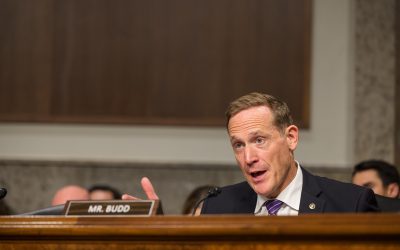Washington, D.C. — Senator Ted Budd (R-NC) has joined a coalition letter led by Senator Bill Cassidy, M.D. (R-LA) blasting the Biden administration for pausing all pending non-FTA export permit applications for liquified natural gas (LNG) export projects.
The letter was co-signed by a total of 25 Senators including Sens. John Barrasso (R-WY), Jim Risch (R-ID), Steve Daines (R-MT), Lisa Murkowski (R-AK), Ted Cruz (R-TX), Cindy Hyde-Smith (R-MS), Tommy Tuberville (R-AL), Marco Rubio (R-FL), Kevin Cramer (R-ND), Jerry Moran (R-KS), Bill Hagerty (R-TN), Lindsey Graham (R-SC), Mike Lee (R-UT), Cynthia Lummis (R-WY), Dan Sullivan (R-AK), Thom Tillis (R-NC), Mike Crapo (R-ID), Pete Ricketts (R-NE), J.D. Vance (R-OH), Tim Scott (R-SC), John Cornyn (R-TX), James Lankford (R-OK), Mike Rounds (R-SD), and John Kennedy (R-LA).
Senator Budd said in a statement:
“The Biden administration’s decision to pause LNG export approvals puts radical, left-wing environmentalists ahead of American families, American workers, and the needs of America’s allies. Jeopardizing billions of dollars, thousands of jobs, and America’s leadership in international LNG markets just to score cheap political points is wrong. President Biden and his administration are simply out of touch with the needs of the American people. Congress must immediately reverse this self-defeating and harmful policy.”
Read the full letter here or below:
Dear President Biden and Secretary Granholm,
We write to express deep concerns with the Department of Energy’s (DOE) review of criteria necessary to approve permits for liquefied natural gas (LNG) export projects and the potential pause to all pending non-FTA export permit applications. This “LNG Plan” drafted without input from Congress could have significant economic, environmental, and national security consequences domestically and globally. It would be reckless to jeopardize our advantage, especially in a world where energy is frequently being used as a geopolitical weapon.
U.S. LNG exports have served as a vital lifeline for countries in Europe and across the globe. Nearly half of U.S. LNG exports have been delivered to Europe to date, with a significant increase in exports following Russia’s invasion of Ukraine. When European imports of LNG increased by 60 percent in 2022, U.S. LNG met that demand.
Without U.S. LNG exports, European leaders would have to decide between depriving their own citizens of energy or actively funding Russia’s war on Ukraine. Moreover, in December 2023, Russia exported LNG at record levels. Russia is also in the process of dramatically expanding its future LNG export capacity.
Now, Iran-backed forces have provoked a second war in the Middle East and are threatening shipping lanes through which LNG is shipped to Europe and Asia. At the same time, Iran is seeking to benefit from the war by ramping its own domestic LNG exports to displace the very supplies it helped to disrupt.
American LNG exports have enhanced our geopolitical influence and international energy security across the board since 2016. In addition to Europe, U.S. LNG has a significant impact on energy security in Asia. Japan and South Korea have been the top two destinations for importing U.S. LNG. Taiwan also imports U.S. LNG, and India is rapidly increasing its imports as well. According to EIA, the four Asian countries accounted for one-fifth of U.S. LNG exports between January and October of 2023. Stable and secure supplies of U.S. LNG are critical to their energy security.
LNG exports from the United States are also uniquely suited to decrease global emissions. Both China and India, two of the largest polluters globally, are top destinations for U.S. LNG exports. Efforts to limit the export of LNG from the United States thus directly undermines the ability to reduce emissions through the use of clean-burning natural gas.
Limiting U.S. LNG exports do not have any impact on the world’s demand for natural gas. Instead, countries including Russia and Iran will simply produce more energy that is subject to less stringent environmental regulations. As a result, limiting American LNG exports in the name of stopping climate change could do just the opposite and add to global emissions.
Finally, the export of U.S. LNG provides significant economic benefits across the country. According to an ICF study, increased exports of U.S. LNG could create more than 450,000 jobs and increase GDP by $73 billion. Given the recent growth in the domestic LNG industry, those benefits could be even greater today and in the future.
We strongly urge you to stop this shortsighted effort. As the President of the United States and as the Secretary of Energy, you should be championing – not undermining – American LNG exports and the environmental, economic, and national security benefits to the United States and our allies.
###



